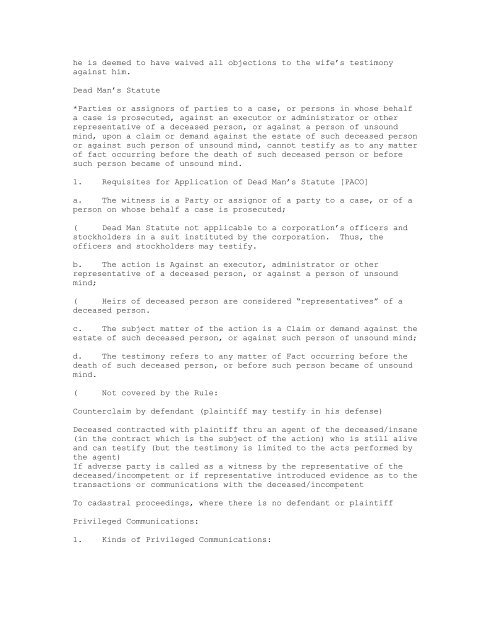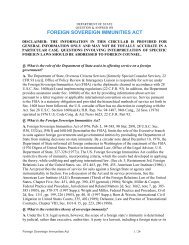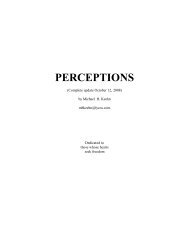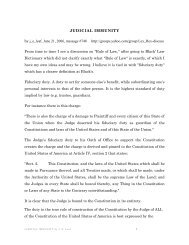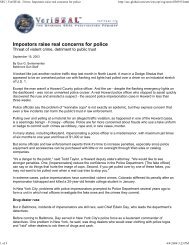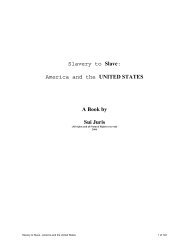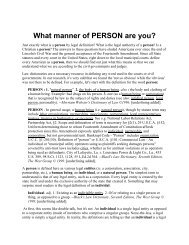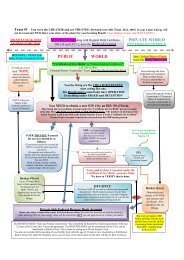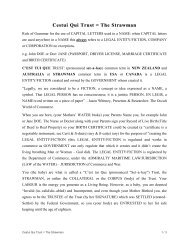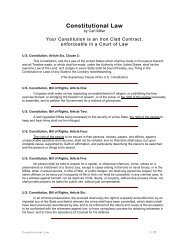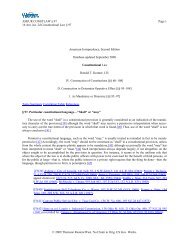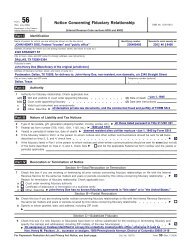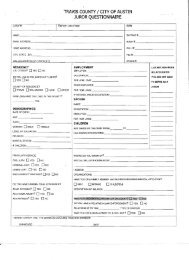EVIDENCE 1. Definitions a. Factum probandum ... - Freedom School
EVIDENCE 1. Definitions a. Factum probandum ... - Freedom School
EVIDENCE 1. Definitions a. Factum probandum ... - Freedom School
Create successful ePaper yourself
Turn your PDF publications into a flip-book with our unique Google optimized e-Paper software.
he is deemed to have waived all objections to the wife’s testimony<br />
against him.<br />
Dead Man’s Statute<br />
*Parties or assignors of parties to a case, or persons in whose behalf<br />
a case is prosecuted, against an executor or administrator or other<br />
representative of a deceased person, or against a person of unsound<br />
mind, upon a claim or demand against the estate of such deceased person<br />
or against such person of unsound mind, cannot testify as to any matter<br />
of fact occurring before the death of such deceased person or before<br />
such person became of unsound mind.<br />
<strong>1.</strong> Requisites for Application of Dead Man’s Statute [PACO]<br />
a. The witness is a Party or assignor of a party to a case, or of a<br />
person on whose behalf a case is prosecuted;<br />
( Dead Man Statute not applicable to a corporation’s officers and<br />
stockholders in a suit instituted by the corporation. Thus, the<br />
officers and stockholders may testify.<br />
b. The action is Against an executor, administrator or other<br />
representative of a deceased person, or against a person of unsound<br />
mind;<br />
( Heirs of deceased person are considered “representatives” of a<br />
deceased person.<br />
c. The subject matter of the action is a Claim or demand against the<br />
estate of such deceased person, or against such person of unsound mind;<br />
d. The testimony refers to any matter of Fact occurring before the<br />
death of such deceased person, or before such person became of unsound<br />
mind.<br />
( Not covered by the Rule:<br />
Counterclaim by defendant (plaintiff may testify in his defense)<br />
Deceased contracted with plaintiff thru an agent of the deceased/insane<br />
(in the contract which is the subject of the action) who is still alive<br />
and can testify (but the testimony is limited to the acts performed by<br />
the agent)<br />
If adverse party is called as a witness by the representative of the<br />
deceased/incompetent or if representative introduced evidence as to the<br />
transactions or communications with the deceased/incompetent<br />
To cadastral proceedings, where there is no defendant or plaintiff<br />
Privileged Communications:<br />
<strong>1.</strong> Kinds of Privileged Communications:


